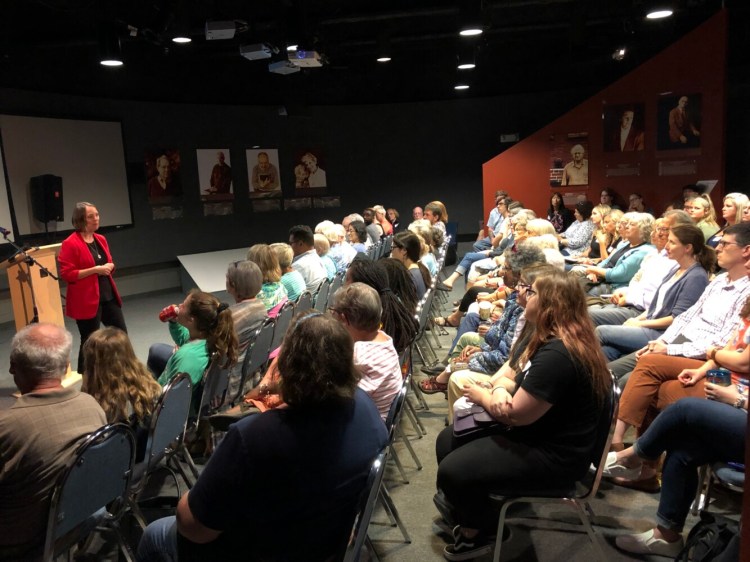AUGUSTA — “There were African American communities in Maine that I didn’t know about,” said Brunswick High School social studies teacher Susan Blake.
These are the people that she wants her students to learn about before she starts teaching about the Civil War, she said.
Blake had just participated in the first day of two-day training at the Holocaust and Human Rights Center of Maine meant to train educators how to teach slavery in Maine.
Historian and educational technician at the Rumford Elementary School Adelaide Solomon-Jordan said she wants her first-graders to know, “We have always been here.”
She will introduce them to individual African Americans, and she will teach them about Lonnie Johnson, who invented the super soaker.
“I want them to be part of my presence and my reality and that of their classmates of color so that we are as significant or insignificant as any of their childhood friendships would be,” Solomon-Jordan said.
The two-day seminar is one of four the HHRC hosted this summer for educators, from elementary teachers to professors.
Keynote speaker of the seminar Shay Stewart-Bouley challenged Maine to actively oppose racism.
“It is no longer enough to be a nonracist,” she said during the “It’s Not Over: Slavery Then, Racism Now” talk.

Kate McMahon of the Smithsonian’s National Museum of African American History and Culture opens a talk on white supremacy and anti-racism at the Holocaust and Human Rights Center of Maine. Kennebec Journal photo by Abigail Austin
Stewart-Bouley is the executive director of the Boston-based civil rights organization Community Change Inc., and she created the “Black Girl in Maine” website.
“How do you see what you do not know exists?” she asked the predominantly white crowd.
Stewart-Bouley spoke on what it means to be a minority in a dominant culture.
“Too often for black people and other people of color, there is a certain amount of denial of self that occurs,” she said. “Often when we are allowed into spaces in a state like Maine, it is under the guise of either equity, and the silent agreement is that we, too, will uphold white supremacy. Our acceptance is conditional on our ability to appease white people and not make them uncomfortable.”
She told the crowd that she was driven to her work and writing after learning about her son’s elementary lessons about African American history after first moving to Maine.
Stewart-Bouley, a native of Chicago, moved to Maine in 2002, according to her blog. Her writing on race inequality and diversity has appeared nationally and locally, including in the Portland Press Herald and Portland Phoenix, and in 2011, she earned a New England Press Association Award for her diversity coverage.
“I think we’re living in a time where it’s important to examine racism and white supremacy in our communities and our country,” said Shenna Bellows, executive director of HHRC.
“Tonight’s event is designed to inspire people to reflect and act, to confront prejudice and discrimination,” she said.
“I learned information I can bring back to school to motivate my students in unique and interesting ways,” said Blake.
HHRC also offered training for educators on teaching about the Holocaust, immigration and anti-bias.
Send questions/comments to the editors.




Success. Please wait for the page to reload. If the page does not reload within 5 seconds, please refresh the page.
Enter your email and password to access comments.
Hi, to comment on stories you must . This profile is in addition to your subscription and website login.
Already have a commenting profile? .
Invalid username/password.
Please check your email to confirm and complete your registration.
Only subscribers are eligible to post comments. Please subscribe or login first for digital access. Here’s why.
Use the form below to reset your password. When you've submitted your account email, we will send an email with a reset code.